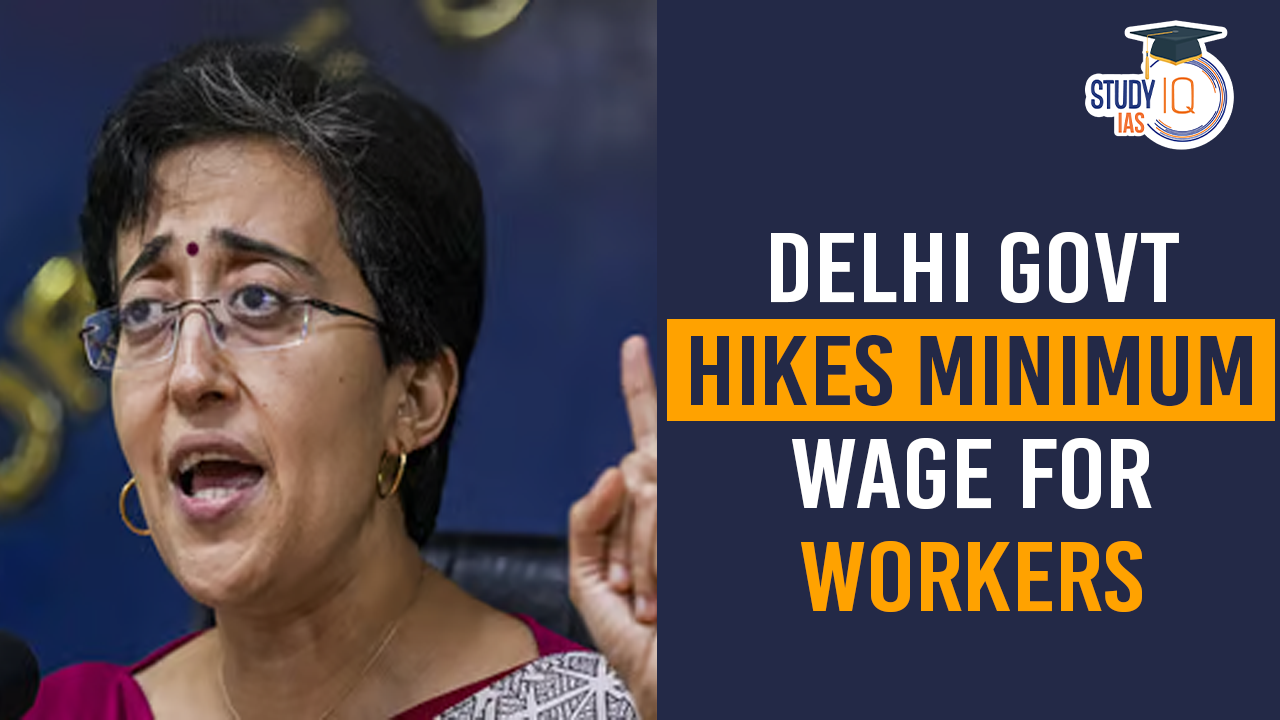Table of Contents
The Delhi Government, under the leadership of Chief Minister Atishi, has recently announced a significant increase in the minimum wages for unorganised sector workers. Effective from October 1, 2024, this wage revision includes a hike in the dearness allowance of approximately 3.2%, bringing much-needed financial support to the daily wage earners in Delhi.
This article provides a comprehensive overview of the Delhi Minimum Wages 2024 and its implications, focusing on the unorganised sector, for aspirants preparing for the UPSC Civil Services Examination.
Key Highlights of the Minimum Wage Revision 2024
- Effective Date: The revised wages will be implemented starting October 1, 2024.
- Scope: This revision primarily benefits workers in the unorganised sector, which includes construction, cleaning, housekeeping, agriculture, and other labor-intensive industries.
- Wage Hike: The minimum wage for daily wage workers has been increased by approximately Rs 600-700 per month, following the inclusion of the dearness allowance.
- Revised Wages:
- Unskilled Workers: Rs 18,066 per month
- Semi-Skilled Workers: Rs 19,929 per month
- Skilled Workers: Rs 21,917 per month
- Matriculate Workers: Rs 21,917 per month
- Graduate Workers: Rs 23,836 per month
Background of Minimum Wage Revision in Delhi
The Delhi Government revises minimum wages biannually, based on changes in the Consumer Price Index (CPI). This ensures that workers’ earnings keep pace with inflation and rising living costs. However, due to procedural delays, the April 2024 wage revision could not be processed. To rectify this, the government combined the dearness allowance for both six-month periods (January-June and July-December) into one cumulative increase of over 3%.
Delhi’s minimum wage structure is among the highest in India, a point highlighted by Chief Minister Atishi during her first press conference. The AAP-led government has been proactive in revising minimum wages since it came to power in 2013, with regular updates aimed at improving the living standards of the city’s labor force. The latest revision marks a continuation of this policy.
Categories of Workers Affected by the Revision
The wage revision affects various categories of workers, each classified according to their skill levels:
- Unskilled Workers: Workers engaged in basic tasks such as manual labor.
- Semi-Skilled Workers: Workers with some level of training or expertise but not classified as skilled labor.
- Skilled Workers: Workers possessing technical knowledge or specific vocational skills.
- Matriculate Workers: Workers who have completed secondary education.
- Graduate Workers: Workers with a college degree or equivalent qualifications.
Importance of Minimum Wage Hike in Delhi
The revision of minimum wages is a crucial step toward ensuring economic justice for the unorganised sector. It plays a significant role in reducing income inequality, lifting workers out of poverty, and promoting social equity.
The Delhi government’s decision to hike wages comes at a time when inflationary pressures have significantly increased the cost of living in urban areas. Workers in the unorganised sector, who are often the most vulnerable to economic shocks, will benefit from this increase as it boosts their purchasing power.
Chief Minister Atishi noted that Delhi’s minimum wage rates are now the highest in India, contrasting it with wages in BJP-ruled states, where they are reportedly much lower. The revision also reflects the AAP government’s commitment to improving the lives of the working class, especially those from economically disadvantaged backgrounds.
Political Reactions and Criticism
While the wage hike has been welcomed by many labor advocates, it has also faced political criticism. Delhi BJP leaders have labeled the increase as an “election gimmick”, accusing the government of using it as a tool to win votes in upcoming elections. They have also pointed out issues with wage disbursement, claiming that many contractual employees do not receive the full wages stipulated by the government due to corruption and inefficiencies in the system.
In response, the AAP government highlighted its legal battles against opposition to wage increases in the past. Chief Minister Atishi mentioned how the BJP previously attempted to block wage hikes in Delhi but was overruled by a court decision in favor of the workers.
Delhi Minimum Wages and Economic Development
For UPSC aspirants, the issue of minimum wage revision is important in understanding the government’s role in labor welfare and income redistribution. It is also relevant in the broader context of economic development and social equity.
The revision of wages in Delhi is an example of how local governments can implement economic policies that address income inequality. For UPSC’s General Studies Paper II (Governance, Constitution, Polity, Social Justice, and International Relations), candidates should focus on:
- Labour Welfare Policies: The government’s responsibility to provide a fair wage and ensure decent working conditions.
- Social Justice: The need to uplift marginalized workers in the unorganised sector.
- Federalism: The role of state governments in setting labor policies and how it compares with national policies.
- Economic Policies: The impact of inflation on wages and how governments adjust wage structures to maintain real incomes.
For General Studies Paper III (Economic Development), this topic provides insight into:
- Poverty Alleviation: How wage hikes can reduce poverty levels.
- Inclusive Growth: Ensuring that economic growth benefits all sections of society, especially those at the bottom of the income pyramid.


 India's Global Capability Centres (GCC) ...
India's Global Capability Centres (GCC) ...
 World Veterinary Day 2025: Theme, Histor...
World Veterinary Day 2025: Theme, Histor...
 Pahalgam Terror Attack: All Eyes on Paha...
Pahalgam Terror Attack: All Eyes on Paha...





















